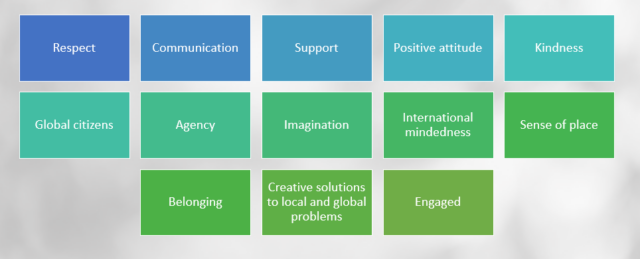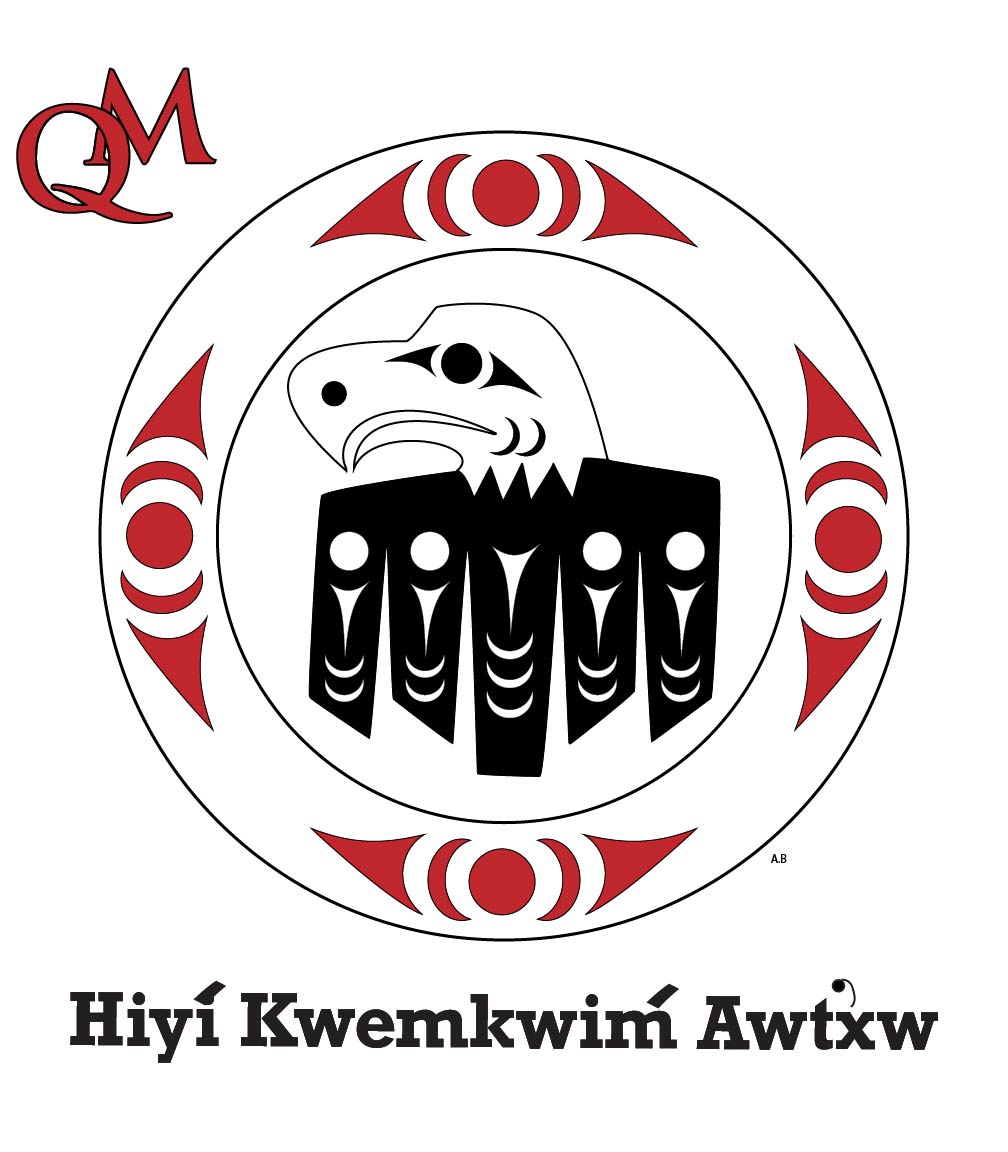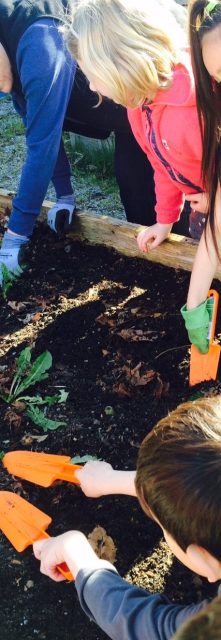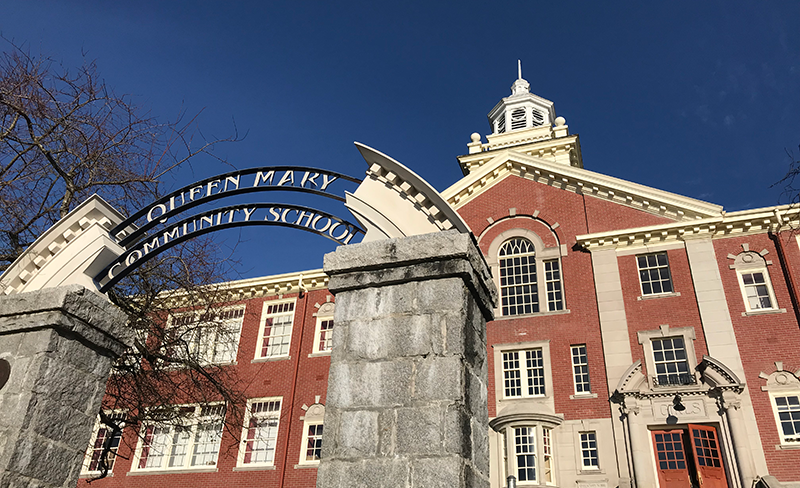Vision to Goal Setting
What is our Vision for Learning?
Queen Mary Community Elementary
Action Plan
International Baccalaureate Primary Years Programme (IB PYP)
QM Vision:
Our vision is to create a community of global citizens who are empowered to embrace diverse perspectives, navigate global complexities, and take action. By cultivating creativity, critical thinking, and a sense of belonging, we inspire students to become compassionate leaders who positively impact the world.
QM Mission:
At Queen Mary we are dedicated to fostering an inclusive community where respect, communication, engagement, support and kindness are paramount. Through meaningful connections and open dialogue, we nurture a culture of empathy and understanding, where every individual feels valued and encouraged to reach their full potential.
QM Core Values:

Planning & Implementation
What is our Action Plan?
Areas of focus for our school plan are derived through student input and staff and parent collaboration. Areas of focus are revised and refined annually.
All authorized IB World Schools are required to go through an external school evaluation by a School Visit Team assigned by the International Baccalaureate Organization (IBO). Queen Mary’s evaluation visit is scheduled for October 2024.
The year before the evaluation visit is spent completing what is referred to as the self-study, a process through which the school community (staff, students, and parents/guardians) identifies areas of strength and areas for growth in relation to the IBO PYP Standards and Practices. The following areas of focus have been identified as areas for growth for the current school year, as we launch into the self-study process.
Areas of Focus for Queen Mary
Inquiry-based Teaching and Learning
“Inquiry nurtures curiosity and promotes enthusiasm for life-long learning. Effective inquiry encourages students to think, challenge, and extend their ideas; it prompts students to reflect and take action.” (Primary Years Programme: Learning and Teaching, p. 40 IBO, 2019)
Goal Statement: Educators at Queen Mary engage in inquiry action and reflection to develop natural curiosity in students to enable them to relate to, explore, and understand the world around them.
Objectives/Areas of Focus:
-Exploring skills of inquiry in order for students to be actively involved in, and take responsibility for their learning.
-Framing learning to allow students to encourage wondering and curiosity.
-Further developing teaching skills in planning, implementing, and assessing inquiry based learning.
Translanguaging
“Translanguaging is the process by which language students actively draw on all their linguistic resources to communicate and make meaning.” (Primary Years Programme: Learning and Teaching, p. 96, IBO, 2019)
Goal Statement: The Queen Mary school community fosters international mindedness and inclusion.
This area for growth was identified through our previous IBO evaluation visit, and as a result, it is a goal that we have had for the past few years.
Objectives/Areas of Focus:
– Acknowledging, honouring, celebrating, and promoting all cultures and languages within our school community.
– Building relationships with the local and global IB community.
– Providing explicit additional language instruction.
– Using local and global contexts in teaching and learning.
– Focusing on the development of the attributes of the IB PYP Learner Profile.
– Acknowledging and accessing all community members, including Indigenous communities, as sources of wisdom and expertise to enhance learning.
Specific aspects of focus for this year:
– Implementation of the Queen Mary French scope and sequence.
– Increasing opportunities for students to express knowledge and understandings in their home language.
– Use of ICT to facilitate multi-lingual communication.
– Connecting with community members and translation services and to facilitate translation.
– Accessing resources that support multi-lingual communications. (ICT/community members and organizations/texts)
– Increasing classroom and learning connections with multi-lingual parent/guardians.
– Having more of Queen Mary’s community members into classrooms sharing language and culture.
IB PYP Self-Study
In the year prior to an IBO evaluation visit, a school enters into a self-study process, reflecting on the degree to which program implementation is meeting the IBO Standards and Practices. With Queen Mary scheduled for an evaluation visit in October 2024 we are currently working through the self-study process.
The IBO provides schools with the Program Standards and Practices that guide schools in the implementation of IB Programmes. The Standards and Practices are organized into four categories:
Purpose: Captures the school’s philosophy, mission, strategy and values.
Environment: Includes the school’s physical, digital, and human resources.
Culture: Articulates school policies and how they are implemented.
Learning: Outcomes that result from the school’s purpose, environment, and culture coming together to deliver curriculum through best practice in approaches to teaching, learning, and assessment.
The reflective component of the self-study process includes gathering evidence connected to the Program Standards and Practices. Using a collaborative approach, staff members, students, and representative parents/guardians will be working together over the course of the year to gather evidence to demonstrate how we are implementing/adhering to the IBO Standards and Practices. The purpose of this work is to acknowledge and celebrate areas of strength and uncover areas for future growth.
Monitor Evaluate & Adapt
What are our Indicators of Progress?
At Queen Mary we support members of our school community by collaborating openly, in order to generate a coherent, rigorous, and dynamic curriculum that leads all students to reach their full potential.
- By collaborating openly we can generate a coherent, rigorous, and dynamic curriculum that will enable all students to reach their full potential.
- We can provide further opportunities to engage the school community in ongoing dialogue.
- We can schedule collaboration so it takes place regularly and systematically.
- We can build effective and purposeful relationships that will enhance collaboration.
- Members of our school community can further support one another in being open-minded and reflective in our practice.
- We can ensure collaboration leaves all members of the school community feeling valued and respected.
- Collaboration is a means of ensuring that members of the school community reach their full potential. Through collaboration we can build our collective collective efficacy.
The Queen Mary school community fosters international mindedness and inclusion.

- We can foster international mindedness and inclusion by building relationships with the wider community and by acknowledging, honouring, and promoting all cultures and languages within our school community.
- We acknowledge community members as sources of wisdom and expertise, and we can engage members of our community more purposefully and frequently in classroom learning.
- We can honour and celebrate the cultural identities of our students and providing explicit additional language instruction.
- We can use local and global contexts in teaching and learning and increase the focus on the development of the attributes of the IB PYP Learner Profile.
The Queen Mary school community fosters inquiry-based learning providing students will opportunities to relate to, explore, and understand the world around them.
We believe that the process of inquiry enables students to authentically relate to, explore and understand the world around them.
Students use inquiry processes to be actively involved in and take responsibility for their learning
Teachers use inquiry, action, and reflection to develop natural curiosity in students.

Communicating Progress
How do we Communicate our Progress?
The school community engages in work relating to the school goals throughout the school year. This work takes place in our regular staff meetings, Pedagogical Team meetings, Joint IB Committee meetings, and Inquiry groups.
Our Joint IB Committee includes representatives from our parent community and Parent Advisory Committee (PAC) executive. Communication with parents takes many forms: On our school website, in Principal’s messages and reports at PAC meetings, at open-house events, in school planning sessions, and during school tours, and orientation sessions.
Latest Progress & Updates
Annual Review for Areas of Focus
2023-24 School Year
Highlights:
Inquiry-based Teaching and Learning:
-Staff members worked together on inquiry-based numeracy teaching and learning; QM hosted our first annual Math Festival
-Visited other IB PYP schools participating in learning rounds as a professional development practice (an inquiry into the implementation of the IB PYP Programme at other NVSD sites).
Translanguaging:
-Programs and devices available in classes for the purposes of translating; Encouraging use of “buddy” translators (peers)
– Encouragement of discussing, writing, and researching in home language in order to enhance conceptual understandings
-Hosted the first annual “Squamish Language Festival” as a way of introducing the Squamish language to all students
-Indigenous Support Worker and Indigenous Literacy Teacher working in classes with teachers and students
-Students doing morning announcements share some of the announcement content in their home language
-Increased sharing of languages and culture in classroom learning and in relation to the development of Units of Inquiry
-French language teaching using draft scope and sequence


